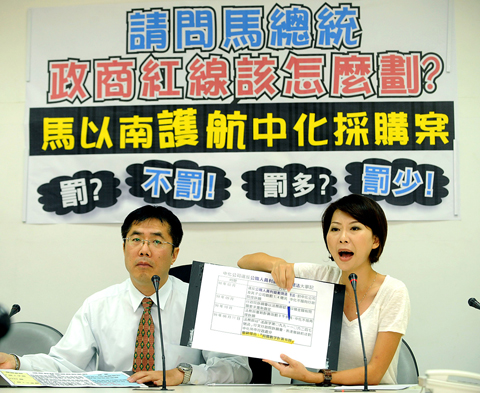The Executive Yuan’s Committee of Appeal has upheld a ruling that sides with China Chemical and Pharmaceutical (CCPC,中國化學製藥) and a subsidiary against the Ministry of Justice in a procurement irregularity involving one of President Ma Ying-jeou’s (馬英九) sisters, Ma Yi-nan (馬以南).
The ministry, which lowered the fine for CCPC and its subsidiary from an initial NT$140 million (US$4.38 million) to NT$90 million in October last year after it lost in the first ruling, now has to review the case again following the second ruling, a committee official said on condition of anonymity.
Asked about the rationale for last Friday’s ruling, the official declined to comment.

PHOTO: LIN CHENG-KUNG, TAIPEI TIMES
In 1998, when Ma Ying-jeou was Taipei mayor and Ma Yi-nan was a deputy manager at CCPC, the Taipei City Government purchased more than NT$90 million in pharmaceuticals from CCPC and NT$50 million from its subsidiary, Chunghwa Yuming Healthcare Co (中化裕民) for Taipei City Municipal Hospital.
The ministry fined the two companies NT$140 million for failing to avoid a conflict of interest.
It decided the deals had violated the Public Officials Conflict of Interest Prevention Act (公職人員利益衝突迴避法) because the mayor’s sister was involved.
The act stipulates that companies that violate the act can be fined between one and three times the amount of the transaction.
In September last year, the Committee of Appeal overruled the ministry, which then reduced the fine.
The two companies, still unhappy with the lower fine, filed another appeal with the committee.
The Liberty Times (the Taipei Times’ sister newspaper), reported the appeal committee said the ministry had asked that the fine be temporarily rescinded. The ministry also said it wanted the case to be reopened.
Chang Chiu-yuan (張秋源), head of the ministry’s Department of Government Ethics, however, was quoted as saying that the ministry had not made such a request.
Chang said the ministry had sent a statement of defense to the CCPC’s appeal — not a request to rescind the punishment.
Meanwhile, Democratic Progressive Party (DPP) legislators accused the Ma administration of playing with the law by overturning the decision.
“When the ministry announced it was fining the pharmaceutical company linked to Ma’s sister, the media said it had ‘guts,’ but those ‘guts’ lasted little more than a year, and now the ministry has changed its decision to flatter Ma [Ying-jeou],” DPP Legislator Chen Ting-fei (陳亭妃) told a press conference in Taipei yesterday.
“The law made a U-turn after encountering Ma,” DPP Legislator Chiu Yi-ying (邱議瑩) said, adding that the decision blurred the line between business and government.
The DPP said Ma Yi-nan was granted sole distribution rights for drugs sold to Taipei City Municipal Hospital, which has several branches.
Ma Ying-jeou has denied the allegations, saying his sister was not involved in selling medicine to the hospital.

GAINING STEAM: The scheme initially failed to gather much attention, with only 188 cards issued in its first year, but gained popularity amid the COVID-19 pandemic Applications for the Employment Gold Card have increased in the past few years, with the card having been issued to a total of 13,191 people from 101 countries since its introduction in 2018, the National Development Council (NDC) said yesterday. Those who have received the card have included celebrities, such as former NBA star Dwight Howard and Australian-South Korean cheerleader Dahye Lee, the NDC said. The four-in-one Employment Gold Card combines a work permit, resident visa, Alien Resident Certificate (ARC) and re-entry permit. It was first introduced in February 2018 through the Act Governing Recruitment and Employment of Foreign Professionals (外國專業人才延攬及雇用法),

CAUTION URGED: Xiaohongshu and Douyin — the Chinese version of TikTok — are tools the Chinese government uses for its ‘united front’ propaganda, the MAC said Mainland Affairs Council (MAC) Minister Chiu Chui-cheng (邱垂正) yesterday urged people who use Chinese social media platforms to be cautious of being influenced by Beijing’s “united front” propaganda and undermining Taiwan’s sovereignty. Chiu made the remarks in response to queries about Chinese academic Zhang Weiwei (張維為) saying that as young Taiwanese are fond of interacting on Chinese app Xiaohongshu (小紅書, known as RedNote in English), “after unification with China, it would be easier to govern Taiwan than Hong Kong.” Zhang is professor of international relations at Shanghai’s Fudan University and director of its China Institute. When giving a speech at China’s Wuhan

ENHANCE DETERRENCE: Taiwan has to display ‘fierce resolve’ to defend itself for China to understand that the costs of war outweigh potential gains, Koo said Taiwan’s armed forces must reach a high level of combat readiness by 2027 to effectively deter a potential Chinese invasion, Minister of National Defense Wellington Koo (顧立雄) said in an interview with the Chinese-language Liberty Times (sister newspaper of the Taipei Times) published yesterday. His comments came three days after US Secretary of State Marco Rubio told the US Senate that deterring a Chinese attack on Taiwan requires making a conflict “cost more than what it’s worth.” Rubio made the remarks in response to a question about US policy on Taiwan’s defense from Republican Senator John Cornyn, who said that Chinese

The zero emissions ship Porrima P111 was launched yesterday in Kaohsiung, showcasing the nation’s advancement in green technology, city Mayor Chen Chi-mai (陳其邁) said. The nation last year acquired the Swiss-owned vessel, formerly known as Turanor PlanetSolar, in a bid to boost Taiwan’s technology sector, as well as ecotourism in Palau, Chen said at the ship’s launch ceremony at Singda Harbor. Palauan President Surangel Whipps Jr and Minister of Foreign Affairs Lin Chia-lung (林佳龍) also attended the event. The original vessel was the first solar-powered ship to circumnavigate the globe in a voyage from 2010 to 2012. Taiwan-based Porrima Inc (保利馬) installed upgrades with